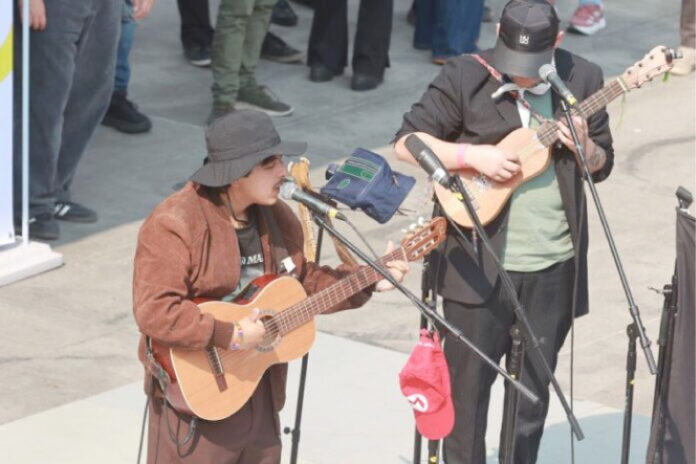by the El Reportero staff
Nearly half a year after President Claudia Sheinbaum called for an end to the glorification of crime, violence and misogyny in Mexican music, her administration is taking a bold step toward that goal with the launch of a new music competition.
Introducing México Canta — a binational singing and songwriting contest designed to inspire young talent on both sides of the border, while promoting music that celebrates culture and peace rather than criminality.
Part of the broader Plan México, this initiative invites aspiring musicians aged 18 to 34 from Mexico and the United States to compete in traditional Mexican genres such as corridos, mariachi, banda and ranchera — so long as their lyrics reject violence and drug glorification. The effort also aims to tap into the robust music production infrastructure in the U.S., encouraging economic and creative crossover between the two nations.
Officially titled México Canta: For Peace and Against Addictions, the program opens for registration on April 28 and closes May 30. A jury organized by the Mexican Music Council will select 10 participants from each Mexican state, and 15 from each of three U.S. regions: West, Central and East. From these 365 initial participants, 48 finalists will be chosen following regional showcases in cities like Chicago, Los Angeles, Oaxaca and Tijuana.
Finalists — eight from each of Mexico’s North, Central and South regions and eight from each U.S. region — will head to Durango for a grand finale scheduled for October 5.
During her Monday morning press conference, President Sheinbaum emphasized the importance of reshaping how young people see themselves — encouraging artistic, athletic, and educational identities in place of those linked to violence or organized crime.
“We’re giving young people the chance to build new narratives,” Sheinbaum said, quoting a line she often repeats: “Joining a criminal group isn’t a life choice. It’s a death choice.”
As part of this cultural push, Sheinbaum also pledged to establish choirs in every public school in Mexico — a move intended to nurture a generation that finds expression through music and community.
The inclusion of the United States in the competition reflects two strategic objectives: elevating Mexican music internationally and inviting a share of the U.S. music industry’s economic power into Mexico. “The creative sector generates jobs and opportunities,” Sheinbaum noted, “and we want to bring more of that into our country.”
Artists will be allowed to perform original work or traditional songs within the contest’s guidelines, and composers are required to submit a new, original piece lasting up to three minutes. Performers can submit a three-minute excerpt of any suitable song. Submissions in Indigenous languages are also welcomed.
The project, led by Mexico’s Culture Ministry in partnership with the Mexican Music Council and private stakeholders, has earned early praise from leaders in the industry. Miguel Ángel Trujillo, head of the Mexican Music Council, described the contest as “historic,” while Guillermo González of the Mexican Association of Phonogram Producers said Mexico’s music scene is poised for international investment. Singer-songwriter Horacio Palencia also applauded the program for seeking to address violence through cultural change.
The initiative comes at a time when narcocorridos — ballads that romanticize the lives of drug traffickers — have become increasingly popular, with artists like Peso Pluma drawing global attention to the genre. Culture Minister Claudia Curiel de Icaza pointed out that while Mexico ranks eighth globally in digital music consumption, more than 70% of Latin music streamed consists of corridos, many of them glorifying the narco lifestyle.
With México Canta, Sheinbaum’s administration hopes to shift that dynamic by empowering young voices to tell a different story — one rooted in heritage, resilience and hope.
More details and registration forms will be available starting April 28 at mexicocanta.gob.mx.
With sources from Excélsior, Contra Línea and Sin Embargo



